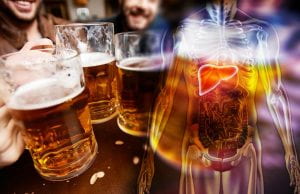With most states legalizing medical cannabis, and others legalizing recreational cannabis use, or decriminalizing cannabis possession, there has been a great deal of interest into how this may affect alcohol use and outcomes. The common debate amongst those for and against the legalization, with regard to alcohol, are the ideas of cannabis as a substitute (those for) or as a complement (those against). Why does it matter? Well, if cannabis and alcohol are substitutes, meaning increases in cannabis use result in decreases in alcohol use, there could be a reduction in alcohol related costs such as healthcare, traffic accidents, dependence, and even deaths [3]. Consuming alcohol can lead to organ failure and other health issues, which can not be said for cannabis. If the two substances are complements, legalization would result in an increase use of both cannabis and alcohol, increasing the costs referenced above significantly. Consuming both simultaneously could lead to even more individual and societal harm than what alcohol causes alone.
Multiple studies have been done trying to understand cannabis legalization’s effects on alcohol in the states which have already legalized it, but it is a hard issue to navigate and truly understand because much of the available research is politically motivated, whether it be influenced by conservative values, liberal values, or the alcohol industries deep pockets; and if I learned one thing from my bio-statistics class, it is that data can be easily manipulated to give the results you want. Also, there has been limited research done on how it could affect women and men differently. The only way we can truly understand the relationship between cannabis and alcohol consumption is if more unbiased research is done, looking at specific indicators and populations.
So, what has the available research shown us so far?
Arguments and evidence for substitution: 
Decrease in Alcohol Sales and Consumption:
Our very own Georgia State University professor, Alberto Chong, published a 10-year study that showed alcohol sales dropped 13% in states with medical marijuana laws [2]. While a separate study showed a decrease in the per-capita sales of beer [3]. Alcohol consumption and likelihood of becoming a frequent drinking has also dropped in states with legal medical and/or recreational cannabis, especially amongst high-schoolers and young adults [3]. A reduction in sales and consumption is considered direct evidence of cannabis as a substitute for alcohol.
Decrease in Alcohol Related Harms:
If cannabis use increases and alcohol use decreases, we would expect to see a large reduction in alcohol related harm. There are no fatal effects of overusing cannabis, unlike binge drinking alcohol, which can kill you quickly and unexpectedly. College students are known to partake in binge drinking, with consequences including alcohol poisoning, drunk driving, and assault. One study showed that alcohol binge use dropped 6% in states with legal recreational cannabis, with an even larger drop in students over 21 years old [1]. Multiple studies on medical, recreational, and decriminalization found a reduction in fatal alcohol related traffic accidents, and emergency room visits mentioning alcohol [1,3]. Though there is little evidence on cannabis’ addictiveness, we know alcohol is highly addictive, so increased cannabis use could reduce the lifelong struggle and health and treatment costs of alcoholism.
As a substitute coping mechanism:
Though using any substance to cope is not good for one’s mental health, using cannabis instead of alcohol could be a better alternative because of the above-mentioned harms associated with alcohol. Substitution depends on a similarity between substance effects. “Neuroscience research indicates that marijuana and low-dose alcohol use share neuro-pharmacologic effects of reward and sedation,” giving evidence to similar effects [3].
College students who tended to use drugs/alcohol to cope showed a substitution effect switching to cannabis, with women less likely to co-use cannabis with alcohol [8]. Dr. Chong and his fellow authors also found evidence of an increase in women using cannabis to self-medicate instead of turning to alcohol [2]. In Washington state legalization of recreational cannabis led to a large decrease in alcohol related harms at home and financial harms for women [7].
Amongst 350 adult customers of medical marijuana dispensaries in Berkeley California, researchers found that 40% of them reported using cannabis as a substitute for alcohol due to its less severe symptoms, better symptom management, and less withdrawal potential [3].
Arguments and evidence for complementary: 
Cannabis use and Co-use harms:
Further relaxing controls on cannabis use could lead to more developmental effects on young adults underdeveloped brains, especially since there is a connection between cannabis and increased risk for psychosis [1]. Also, since cannabis is most commonly used through smoke inhalation, there could be significant lung issues from chronic use. Multiple studies against legalization use the “gateway drug argument,” with one study showing cannabis use is associated with later symptoms of alcohol disorders [3]. Women’s progression to cannabis use disorders (CUD) is much faster than males and despite women using cannabis less regularly than men, they have more severe psychiatric, medical, and employment complications. [6] Also adolescent girls are more likely to meet the criteria for cannabis abuse [6].
When alcohol and cannabis are used simultaneously there is more risk and danger than when either is used alone, “for example, those who use marijuana and alcohol together have the highest rates of unsafe driving” [3]. Studies have also shown that THC (tetrahydrocannabinol) levels increase if alcohol is consumed simultaneously resulting in more pleasurable mood effects [3]. This might lead to people combining the substances to reach a better high. If judgment or decision-making is impaired by cannabis, unintended increases in alcohol consumption could result.
Academic performance:
College students who use cannabis infrequently by itself have lower GPAs, and those who report co-use have an even greater decrease in their GPAs, affecting males more than females [5]. This is mostly likely due to cannabis impairing mental functioning and memory. Students were also less like to graduate on time or even be enrolled their senior year [8]. Those who were less likely to use drugs normally, showed a complementary effect in states with legal recreational cannabis, reporting co-use approximately once a month [8].
So, what does all this mean?
Alcohol and cannabis have both been used since the earliest recorded human history and have been the two most commonly used intoxicants in the United States for decades. The early stigma of cannabis use in the United States is a result of racism and prejudice, propaganda portraying users (minorities) as thieves, rapists, and murders, with no scientific evidence backing these claims up [4]. The increasing amount of evidence on the health benefits of cannabis has begun to break down the negative connotations associated with its use. If the stigmas are broken down even more, that could lead to better unbiased research. Also, with limited evidence for both positive and negative effects of cannabis use for women, future research should focus on better determining the difference between sexes.
With alcohol laws changing at the same time as cannabis laws, it can be hard to show correlations between the two. Whether showing a substitution or complementary effect, most studies made sure to mention that substance use, no matter which substance, most importantly depends on prices, age, availability, convenience, and what motivates one to drink [3,8]. To better understand the public health implications and inform policy decisions, the factors that influence substance use must be identified. And no matter whether they are substitutes or complements, moderation is still critical. Its important to mention that cannabis legalization and use could have no effect on alcohol issues. So, what does all this mean? We’ll have to wait and see.
References:
- Alley, Z. M., Kerr, D. C., & Bae, H. (2020). Trends in college students’ alcohol, nicotine, prescription opioid and other drug use after recreational marijuana legalization: 2008–2018. Addictive Behaviors, 102, 106212. doi: 10.1016/j.addbeh.2019.106212
- Baggio, M., Chong, A., & Kwon, S. (2017). Helping Settle the Marijuana and Alcohol Debate: Evidence from Scanner Data. SSRN Electronic Journal. doi: 10.2139/ssrn.3063288
- Guttmannova, K., Lee, C. M., Kilmer, J. R., Fleming, C. B., Rhew, I. C., Kosterman, R., & Larimer, M. E. (2015). Impacts of Changing Marijuana Policies on Alcohol Use in the United States. Alcoholism: Clinical and Experimental Research, 40(1), 33–46. doi: 10.1111/acer.12942
- Ivanov, K. (2017, March). High Times: The evolution of the stigma on marijuana and attempts to tear it down. Retrieved from https://www.lakeforest.edu/live/news/8003-high-times-the-evolution-of-the-stigma-on
- Meda, S. A., Gueorguieva, R. V., Pittman, B., Rosen, R. R., Aslanzadeh, F., Tennen, H., … Pearlson, G. D. (2017). Longitudinal influence of alcohol and marijuana use on academic performance in college students. Plos One, 12(3). doi: 10.1371/journal.pone.0172213
- Secades-Villa, R., & Fernández-Artamendi, S. (2017). Gender Differences in Cannabis Use Disorders. Handbook of Cannabis and Related Pathologies, 131–137. doi: 10.1016/b978-0-12-800756-3.00015-6
- Subbaraman, M. S., & Kerr, W. C. (2020). Subgroup trends in alcohol and cannabis co-use and related harms during the rollout of recreational cannabis legalization in Washington state. International Journal of Drug Policy, 75, 102508. doi: 10.1016/j.drugpo.2019.07.003
- Suerken, C. K., Reboussin, B. A., Egan, K. L., Sutfin, E. L., Wagoner, K. G., Spangler, J., & Wolfson, M. (2016). Marijuana use trajectories and academic outcomes among college students. Drug and Alcohol Dependence, 162, 137–145. doi: 10.1016/j.drugalcdep.2016.02.041
- Tardosky, E., Tardosky, E., Tardosky, E., Meyer, M., Meyer, M., Meyer, M., … Meyer, M. (2020, January 11). Cannabis vs Alcohol in 2020: Drinking Deaths on the Rise, is Marijuana the Answer? Retrieved from https://www.healthmj.com/cannabis/alcohol-marijuana-use/


Thank you so much for sharing this useful information! It always fascinates me when older people, who have drank their whole lives, tell us that marijuana is more dangerous than alcohol. But based on the information and studies you shared I would say it is the opposite. I almost feel like lawmakers should consider legalizing marijuana and de-legalizing alcohol, as there are more harms than benefits with alcohol. Like you, I am interested to see where the law changes go and if usage or lack of one substance or the other, or both, occurs in the future.